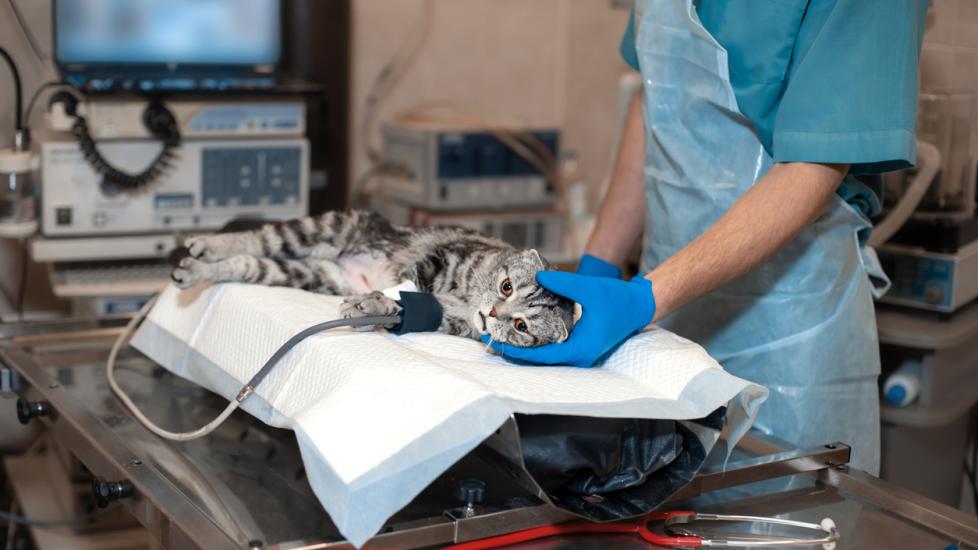Shock in Cats
What Is Shock in Cats?
Shock is a complex, whole-body reaction that can have numerous, different causes and is often the result of a disease process. It occurs when there is an inadequate energy production in the cells or a decrease in the transportation of oxygen (often due to a decrease in blood flow or volume) that results in the death of the cell, the tissue, and ultimately the animal. It is extremely life-threatening and therefore requires prompt veterinary medical attention.
Types of Shock in Cats
Cats can experience multiple types of shock and they can experience them at the same time, making diagnosis and treatment extremely important!
-
Hypovolemic shock: This occurs when there is a significant loss of fluid, often seen with hemorrhage, such as from a motor vehicle accident or from significant dehydration caused by vomiting and diarrhea. The fluid loss is a result of less circulating blood volume and less oxygen being delivered to the body.
-
Cardiogenic shock: Most often witnessed with heart failure, this is a condition where the heart’s ability to contract and push out a normal amount of blood diminishes, causing less and less blood and oxygen to be delivered to the tissues. In cats, this is usually due to the thickening of the heart walls, a type of heart disease called hypertrophic cardiomyopathy (HCM).
-
Distributive shock: This often occurs as an aftereffect of severe pancreatitis (inflammation of the pancreas), sepsis (infection of the blood stream, most caused by a bacterial infection), or anaphylaxis (allergic response) where there is a decrease in the amount of blood reaching vital organs. This is caused by a dilation of blood vessels and a corresponding drop in blood pressure.
-
Obstructive shock: This occurs when there is an obstruction to the flow of blood. Fortunately, it’ not common in cats, but it can occur with pericardial effusion (too much fluid in the sac surrounding the heart) or with pulmonary thromboembolism (a blood clot in the lungs).
Symptoms of Shock in Cats
The majority of cats suffering from shock exhibit the following hallmarks:
-
Hypothermia (low body temperature, <97 F)
-
Bradycardia (low heart rate, <140 beats per minute)
-
Hypotension (abnormally low blood pressure, <100 mmHg systolic)
Because the above signs are challenging to determine without the aid of specialized equipment, cat parents will want to look out for the following symptoms:
-
Lethargy and/or confusion
-
Cooler than normal limbs or paws
-
Pale or discolored gums
-
Shallow or rapid breathing (>60 breaths per minute)
-
Blood-tinged fluid coming from the nose or mouth
-
Rapid or absent pulses
-
Vomiting and diarrhea
Causes of Shock in Cats
The causes of shock in cats are numerous, with trauma and allergic reactions the most common after heart disease, infection, heat stroke, complications of underlying illnesses, and exposure to toxins.
How Veterinarians Diagnose Shock in Cats
Because shock is life-threatening, and the timeliness of diagnosis and treatment is critical for survival, taking your cat to the veterinarian (preferably an emergency or specialty hospital), is crucial as soon as symptoms are noticed. The veterinarian will begin with a physical exam, which may prompt certain tests that include measuring your cat’s blood pressure and running baseline bloodwork to check for signs of blood loss and infection, and to determine if its organs are still functioning.
Additional bloodwork may then be advised to measure blood gases, blood clotting ability, and to assess the level of cell damage. To look more intently at your pet’s heart function, a series of imaging tests may be performed. These include X-ray, ultrasound, or an echocardiogram—or all three depending on the signs present—and an electrocardiogram (EKG).
Treatment of Shock in Cats
All cases of shock require immediate veterinary care, and specific treatments will be prescribed tailored to the type of shock. This may include IV fluid therapy and oxygen supplementation as primary supports along with whole-body warming, a blood transfusion, pain control, and other medications to stabilize the blood pressure and treat arrythmias, nausea, and vomiting. Because cats can die from being given the wrong type of blood, your cat’s blood type would need to be determined prior to any transfusion.
Occasionally, surgery may be needed if there is internal or external trauma such as pericardial effusion (in rare cases) where a pericardiocentesis procedure (withdrawing excess fluid from the heart sac) may be required.
For cats experiencing anaphylactic shock, epinephrine (adrenaline) will most likely be administered immediately to reduce the severity of the allergic reaction. In the treatment of cardiogenic shock, diuretics (water pills) rather than IV fluids are used. For septic shock, antibiotics are given to try to cure the underlying infection.
Recovery and Management of Shock in Cats
Cats that have suffered shock need hourly and daily monitoring, as the chances of making a full recovery vary, and are often related to the degree of underlying illness and symptoms present. Cats that are promptly and appropriately treated in the earlier stages of shock often go on to make a full recovery and may have relatively few or no debilitating secondary effects. Others, unfortunately, even with aggressive treatment, may die or suffer from long-term irreversible complications.
References
Hopper K, Silverstein DC, Bateman S. Shock syndromes–Fluid, Electrolyte, and Acid-Base Disorders in Small Animal Practice. 4th ed. Elsevier; 2012.
Featured Image: iStock.com/Kateryna Kukota
